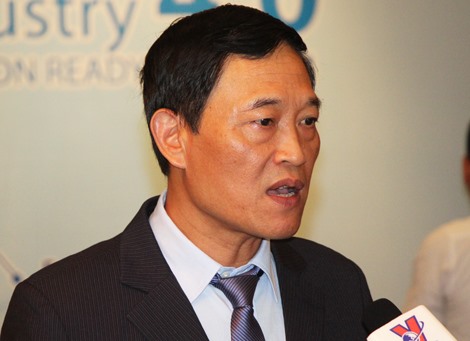.jfif) Opinion
Opinion

Dr Trần Văn Tùng, Deputy Minister of Science and Technology, speaks to the newspaper Hà Nội Mới (New Hà Nội) about a promising market for technology transfer in Việt Nam under the 2017 Law on Technology Transfer
 |
| Trần Văn Tùng |
Dr Trần Văn Tùng, Deputy Minister of Science and Technology, tells Hà Nội Mới (New Hà Nội) that the new Law on Technology Transfer aims to prevent the import of outdated technologies and encourage adoption of latest advances.
Experts have said that there is a need to renew the thinking as well as State management of technology transfer. Can you comment?
From the perspective of a State management agency, we have to confess that the management of technology transfer in our country has not been done properly. It is high time that we make a drastic change in the way we think about it, and this change should be reflected in developing the Law on Technology Transfer.
Of course, the most important idea in developing the law is to enable the country to absorb advanced technology and apply it to develop our own scientific and technological capabilities. On the other hand, we must avoid turning our country into a “dumping ground” that can negatively affect our environment, national security and defence.
The revised Law on Technology Transfer, which was recently adopted by the National Assembly, will no doubt enable Vietnamese enterprises to absorb and apply new technology in order to increase their production capacity and their competitiveness in both domestic and foreign markets.
Can you brief us on some salient features of this revised law
Technology transfer and application has well been described in the law. For example, the law covers well the initial period of making investment decisions and choosing appropriate technologies. The State Appraisal Council has the duty to assess the technology of all projects that have been approved by the National Assembly. Meanwhile, the Ministry of Science and Technology (MoST) will play the key role in choosing the technology in consultation with other concerned government agencies. This means that the MoST and other government agencies have to analyse thoroughly the pros and cons of selected technologies and present them to the Prime Minister for him to make the final decision.
Similar procedures are also applied for projects at provincial levels to ensure that no outdated technology is imported into the country.
What are some of the measures contained in the law to encourage technology transfer?
While revising the law, we paid a lot of attention to encouraging all research institutions/organisations to collect market information and the society’s real needs. Of course, later on, these institutions/organisations are free to transfer their research results to enterprises or go into joint-ventures w in applying the new technology. I feel this is a good way to make the scientists combine theory with practice and help solve problems in real life. This will help the development of enterprises and boost socio-economic development.
Under the revised law, the State will issue specific policies to support start ups and encourage them to be innovative in all fields. Among other things, these policies will cover the definition of ownership rights and the rights to use assets developed through scientific research.
However, just passing this law is not enough. Other laws have to be bought into sync with the new one. If this is not done, we will fail in our objectives to boost the start ups industry and import the most advanced technologies into the country.
Can you elaborate on what you think will be the impact of the 2017 Law on Technology Transfer on the country’s socio-economic development?
I’m confident that when the law comes into effect on July 1st 2018, it will create favourable conditions for improving technology levels in the country as well as enterprises’ capacity to apply advanced technology in their production, thereby enhancing efficiency and competitiveness, not to mention the quality of labour.
At the same time, under the new law, State management agencies will have another tool to prevent the import of outdated technology.
In addition, the science and technology market will be elevated to a higher level and become a place for regular exchange and updates of technology. And there is no doubt that closer co-operation will be forged between scientists and enterprises towards solve their own problems as well as problems at the national level. — VNS




